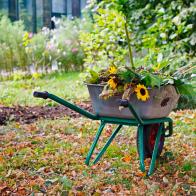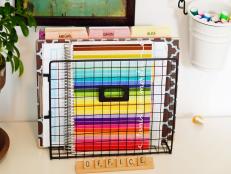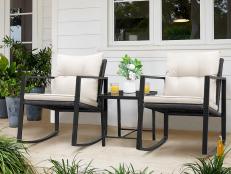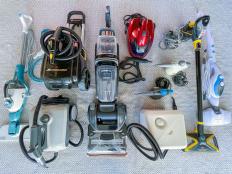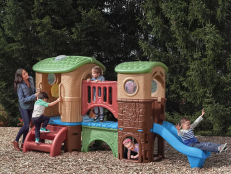Why Am I So Disorganized?
When it comes to getting organized, says author and organization guru Julie Morgenstern, too many people attack first and ask questions later. With cash in hand, these folks hurry to the store in search of the latest bins, boxes and baskets that promise to rescue them from the clutter overtaking their lives — and their sanity. This approach, which she calls "organizing from the outside in," is often expensive, demoralizing and, in the end, unsuccessful.
To create an organizational system that will prove truly useful, Morgenstern explains, "a person needs to honor their own unique personality and design a system around that." In her best-selling book, Organizing from the Inside Out, Morgenstern advises her readers to examine their habits and behaviors before creating a plan of action.
"Ask questions first, attack second," she says. "We need to understand the problem before we can come up with a solution."
In her 18 years as a professional organizer, Morgenstern has come to know that more often than not, there are hidden forces — psychological roadblocks — that are preventing her clients from achieving organizational nirvana. "People often wrongly assume that they are sloppy, dirty or lazy, or that they just don't have enough storage space," she says. In reality, in almost every case there are deep-rooted obstacles that push her clients toward disorder.
Psychological Obstacles
Morgenstern distinguishes psychological obstacles from those that are "technical" or "external." "Technical errors are simple, mechanical mistakes in a person's organizing system that make it impossible to succeed," she explains. Easy to remedy, these roadblocks include not storing items where they are used or simply having more stuff than space. External realities are those factors outside one's control that make it hard to sustain a system, such as an unbearable workload, uncooperative housemates or limited space.
In contrast, psychological obstacles are those hidden personality traits that seem to sabotage one's organizational system, despite how much we might try to succeed. With labels like "the need for abundance," "the conquistador of chaos" and "sentimental attachment," these internal impediments need to be addressed before any lasting success can be achieved.
The good news is the would-be organizer needn't make a date with Dr. Freud to prevail. "We don't necessarily need to solve these issues, we just need to identify them and build a system of organization around them," Morgenstern says.
The Need for Abundance
Take a good look around your house: Do you have a foothill of shoes? Every conceivable size and shape of pot and pan? Six tubes of toothpaste and twice as many toothbrushes? If so, you may be one of the many homeowners bogged down by a need for abundance. Some of us just seem to feel better when we are surrounded by too much stuff.
As a New York City-based professional organizer, Dahlia Bellows, licensed master social worker, often confronts this particular type of client. And, she says, they require a gentle approach. "For folks who take comfort from their stuff, there is a lot of anxiety about getting rid of anything," she says. To put these clients at ease, Bellows assures them that nothing will be thrown away in the initial stages of the organization process. Starting with one bite-size section at a time — a closet, for example — Bellows will have the client sort and categorize every single item. "After doing this simple step," she says, "clients often see for the first time the true breadth of their possessions, and they come to their own realization that stuff needs to go."
Conquistador of Chaos
No, this is not a Hollywood biopic on the life of Cortés, the Spanish conquistador. "Conquistadors of chaos get personal satisfaction from pulling order out of chaos," says Andrea Sharb, a professional organizer in Avon Lake, Ohio. Whether deliberately or unconsciously, individuals with this particular roadblock maintain a certain level of disorder in their lives and home because they simply enjoy the challenges it presents. "These people avoid getting organized because if there isn't something to fix or rescue, they feel valueless" Sharb adds.
But constantly operating in crisis mode is both inefficient and stressful. "Ultimately, this system will take its toll on you — and it really doesn't work," Sharb says. By determining and prioritizing goals, and designing and maintaining a lasting organizational system, the conquistador of chaos will have more time to tackle issues other than finding the car keys. World peace, perhaps?
Sentimental Attachment
It may sound like a sappy love song, but sentimental attachment will lead one down the rocky road to disorganization. Despite the fact that the shoes pinch, the pants are stained and the elastic on the skirt blew out long ago, people harboring a sentimental attachment may not be able to part with items they no longer wear.
"Many people hold onto items for purely sentimental reasons," Sharb explains. Because they associate these objects with a specific life event or person, it makes discarding them akin to discarding memories. Perhaps the shoes were worn during a successful job interview; the skirt a mother's first maternity outfit; the slacks belonging to a departed loved one.
Sharb directs these clients to categorize items into past, present and future: things they once used, are currently using and plan to use in the future. Sharb poses some pointed questions to the items in the past and future piles: Do you plan on having any more children? Do you think someone else might get more use from this item? Do you absolutely love it, and is it genuinely useful?
"It's amazing the look of relief that comes over clients' faces when they finally get it," Sharb says.




